Organisational Behaviour Analysis: Tesco's Culture and Politics
VerifiedAdded on 2023/06/04
|15
|4885
|423
Report
AI Summary
This report delves into the organisational behaviour of Tesco, a multinational food retailer, analyzing the impact of culture, politics, and power on individual and team performance. It explores Handy's culture model, examining power, task, role, and person cultures within Tesco. The report also investigates motivational theories, including Maslow's hierarchy of needs and Vroom's expectancy theory, and how Tesco utilizes them to enhance employee engagement and achieve company goals. Furthermore, it identifies crucial factors for building effective teams and discusses philosophies and concepts of organisational behaviour, providing a comprehensive overview of Tesco's strategies for fostering a productive and motivated workforce.
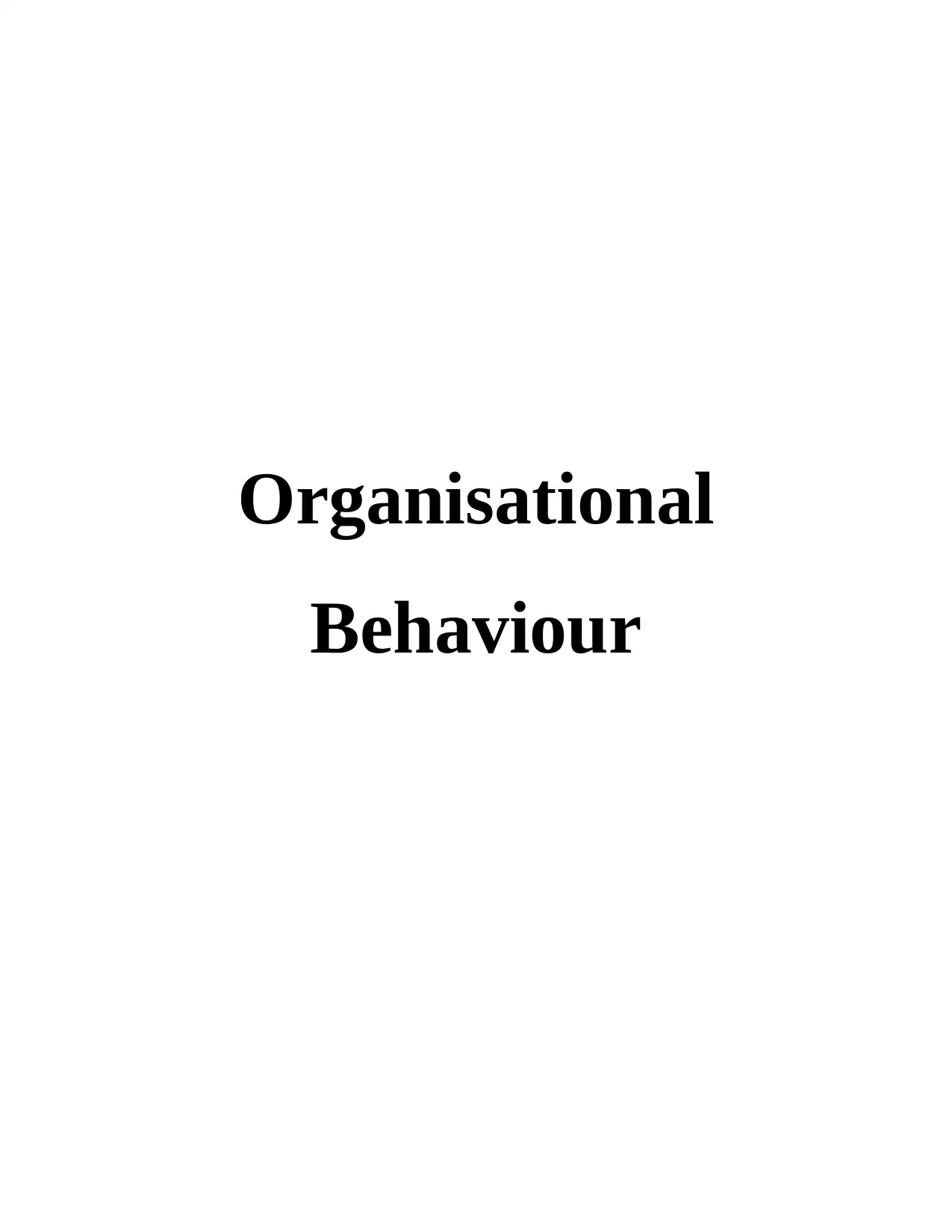
Organisational
Behaviour
Behaviour
Paraphrase This Document
Need a fresh take? Get an instant paraphrase of this document with our AI Paraphraser
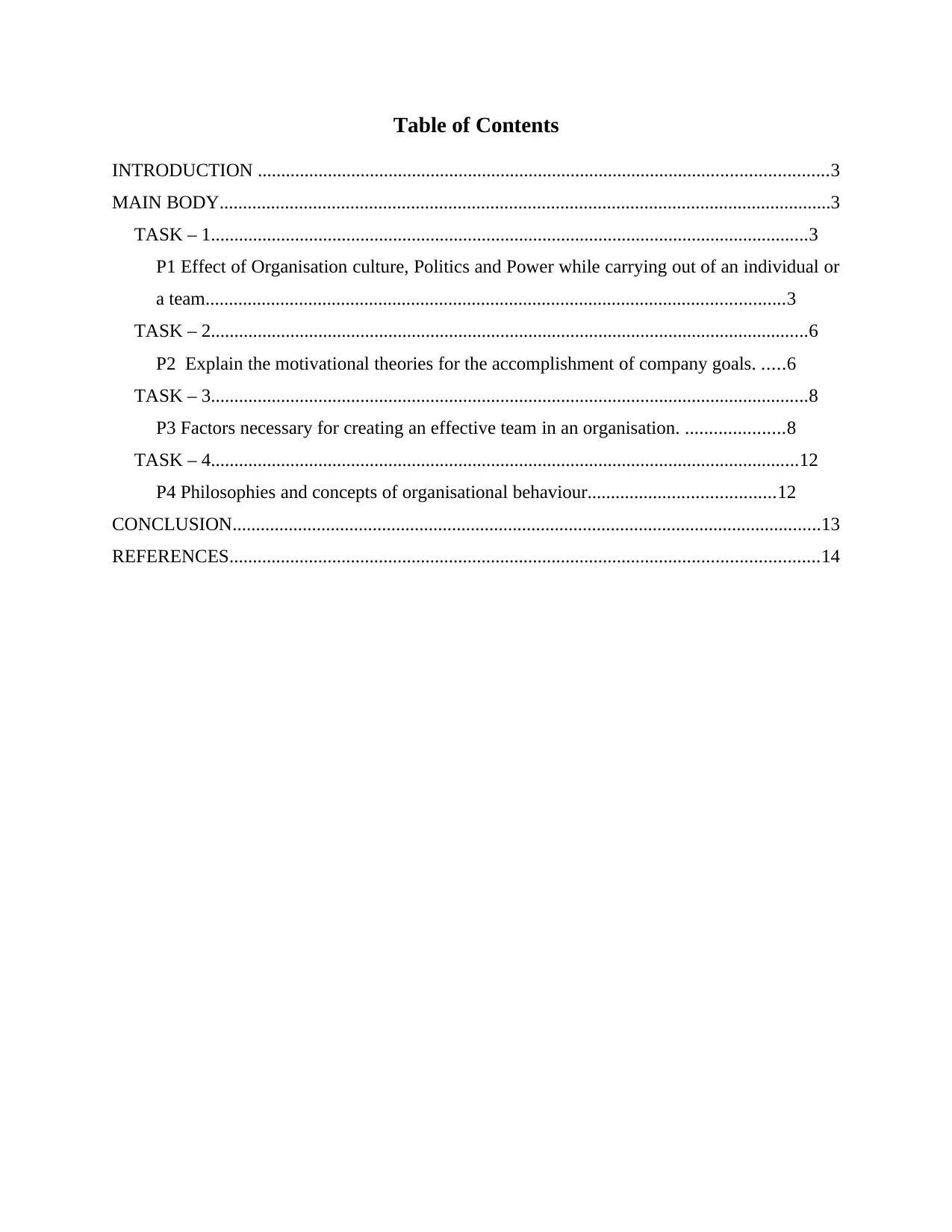
Table of Contents
INTRODUCTION ..........................................................................................................................3
MAIN BODY...................................................................................................................................3
TASK – 1................................................................................................................................3
P1 Effect of Organisation culture, Politics and Power while carrying out of an individual or
a team............................................................................................................................3
TASK – 2................................................................................................................................6
P2 Explain the motivational theories for the accomplishment of company goals. .....6
TASK – 3................................................................................................................................8
P3 Factors necessary for creating an effective team in an organisation. .....................8
TASK – 4..............................................................................................................................12
P4 Philosophies and concepts of organisational behaviour........................................12
CONCLUSION..............................................................................................................................13
REFERENCES..............................................................................................................................14
INTRODUCTION ..........................................................................................................................3
MAIN BODY...................................................................................................................................3
TASK – 1................................................................................................................................3
P1 Effect of Organisation culture, Politics and Power while carrying out of an individual or
a team............................................................................................................................3
TASK – 2................................................................................................................................6
P2 Explain the motivational theories for the accomplishment of company goals. .....6
TASK – 3................................................................................................................................8
P3 Factors necessary for creating an effective team in an organisation. .....................8
TASK – 4..............................................................................................................................12
P4 Philosophies and concepts of organisational behaviour........................................12
CONCLUSION..............................................................................................................................13
REFERENCES..............................................................................................................................14
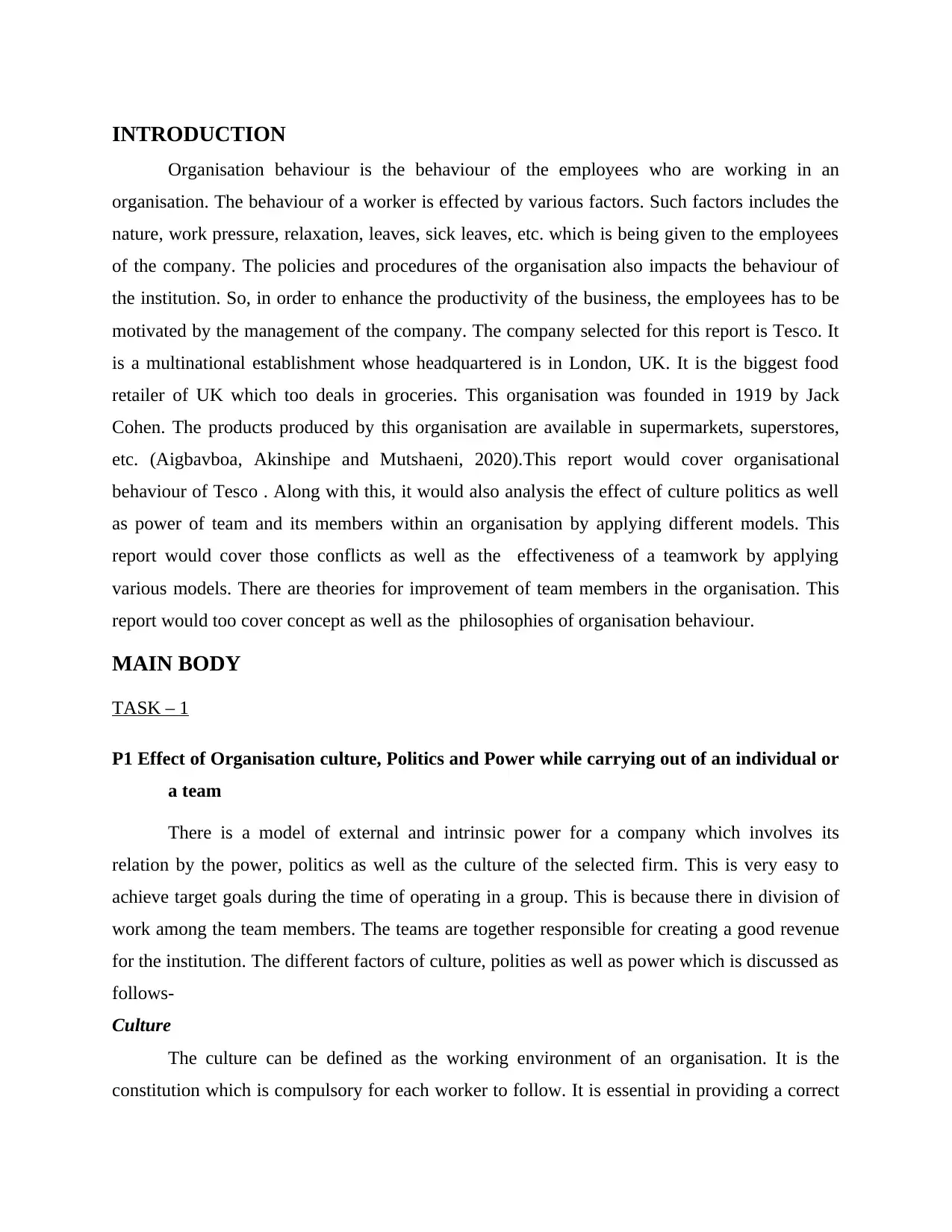
INTRODUCTION
Organisation behaviour is the behaviour of the employees who are working in an
organisation. The behaviour of a worker is effected by various factors. Such factors includes the
nature, work pressure, relaxation, leaves, sick leaves, etc. which is being given to the employees
of the company. The policies and procedures of the organisation also impacts the behaviour of
the institution. So, in order to enhance the productivity of the business, the employees has to be
motivated by the management of the company. The company selected for this report is Tesco. It
is a multinational establishment whose headquartered is in London, UK. It is the biggest food
retailer of UK which too deals in groceries. This organisation was founded in 1919 by Jack
Cohen. The products produced by this organisation are available in supermarkets, superstores,
etc. (Aigbavboa, Akinshipe and Mutshaeni, 2020).This report would cover organisational
behaviour of Tesco . Along with this, it would also analysis the effect of culture politics as well
as power of team and its members within an organisation by applying different models. This
report would cover those conflicts as well as the effectiveness of a teamwork by applying
various models. There are theories for improvement of team members in the organisation. This
report would too cover concept as well as the philosophies of organisation behaviour.
MAIN BODY
TASK – 1
P1 Effect of Organisation culture, Politics and Power while carrying out of an individual or
a team
There is a model of external and intrinsic power for a company which involves its
relation by the power, politics as well as the culture of the selected firm. This is very easy to
achieve target goals during the time of operating in a group. This is because there in division of
work among the team members. The teams are together responsible for creating a good revenue
for the institution. The different factors of culture, polities as well as power which is discussed as
follows-
Culture
The culture can be defined as the working environment of an organisation. It is the
constitution which is compulsory for each worker to follow. It is essential in providing a correct
Organisation behaviour is the behaviour of the employees who are working in an
organisation. The behaviour of a worker is effected by various factors. Such factors includes the
nature, work pressure, relaxation, leaves, sick leaves, etc. which is being given to the employees
of the company. The policies and procedures of the organisation also impacts the behaviour of
the institution. So, in order to enhance the productivity of the business, the employees has to be
motivated by the management of the company. The company selected for this report is Tesco. It
is a multinational establishment whose headquartered is in London, UK. It is the biggest food
retailer of UK which too deals in groceries. This organisation was founded in 1919 by Jack
Cohen. The products produced by this organisation are available in supermarkets, superstores,
etc. (Aigbavboa, Akinshipe and Mutshaeni, 2020).This report would cover organisational
behaviour of Tesco . Along with this, it would also analysis the effect of culture politics as well
as power of team and its members within an organisation by applying different models. This
report would cover those conflicts as well as the effectiveness of a teamwork by applying
various models. There are theories for improvement of team members in the organisation. This
report would too cover concept as well as the philosophies of organisation behaviour.
MAIN BODY
TASK – 1
P1 Effect of Organisation culture, Politics and Power while carrying out of an individual or
a team
There is a model of external and intrinsic power for a company which involves its
relation by the power, politics as well as the culture of the selected firm. This is very easy to
achieve target goals during the time of operating in a group. This is because there in division of
work among the team members. The teams are together responsible for creating a good revenue
for the institution. The different factors of culture, polities as well as power which is discussed as
follows-
Culture
The culture can be defined as the working environment of an organisation. It is the
constitution which is compulsory for each worker to follow. It is essential in providing a correct
⊘ This is a preview!⊘
Do you want full access?
Subscribe today to unlock all pages.

Trusted by 1+ million students worldwide
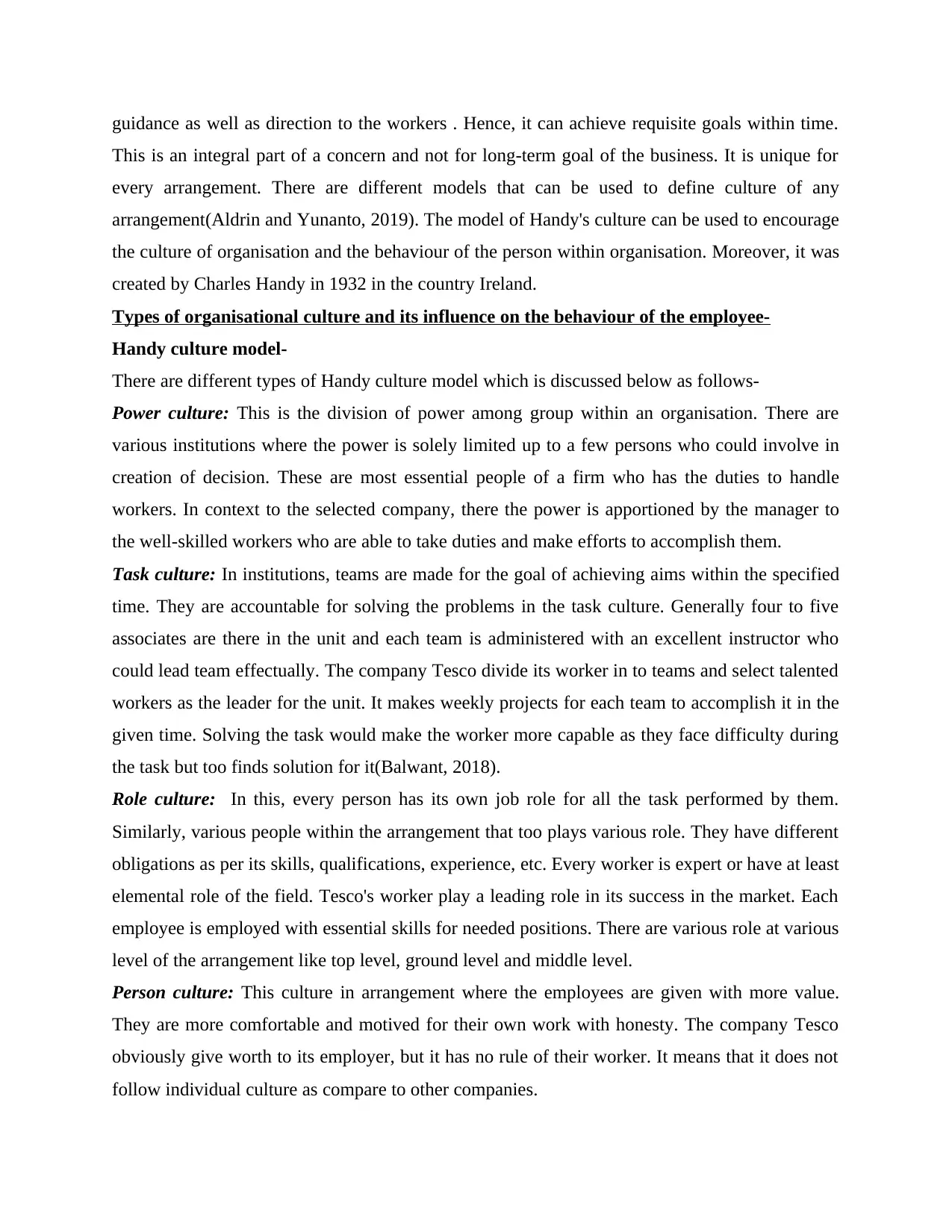
guidance as well as direction to the workers . Hence, it can achieve requisite goals within time.
This is an integral part of a concern and not for long-term goal of the business. It is unique for
every arrangement. There are different models that can be used to define culture of any
arrangement(Aldrin and Yunanto, 2019). The model of Handy's culture can be used to encourage
the culture of organisation and the behaviour of the person within organisation. Moreover, it was
created by Charles Handy in 1932 in the country Ireland.
Types of organisational culture and its influence on the behaviour of the employee-
Handy culture model-
There are different types of Handy culture model which is discussed below as follows-
Power culture: This is the division of power among group within an organisation. There are
various institutions where the power is solely limited up to a few persons who could involve in
creation of decision. These are most essential people of a firm who has the duties to handle
workers. In context to the selected company, there the power is apportioned by the manager to
the well-skilled workers who are able to take duties and make efforts to accomplish them.
Task culture: In institutions, teams are made for the goal of achieving aims within the specified
time. They are accountable for solving the problems in the task culture. Generally four to five
associates are there in the unit and each team is administered with an excellent instructor who
could lead team effectually. The company Tesco divide its worker in to teams and select talented
workers as the leader for the unit. It makes weekly projects for each team to accomplish it in the
given time. Solving the task would make the worker more capable as they face difficulty during
the task but too finds solution for it(Balwant, 2018).
Role culture: In this, every person has its own job role for all the task performed by them.
Similarly, various people within the arrangement that too plays various role. They have different
obligations as per its skills, qualifications, experience, etc. Every worker is expert or have at least
elemental role of the field. Tesco's worker play a leading role in its success in the market. Each
employee is employed with essential skills for needed positions. There are various role at various
level of the arrangement like top level, ground level and middle level.
Person culture: This culture in arrangement where the employees are given with more value.
They are more comfortable and motived for their own work with honesty. The company Tesco
obviously give worth to its employer, but it has no rule of their worker. It means that it does not
follow individual culture as compare to other companies.
This is an integral part of a concern and not for long-term goal of the business. It is unique for
every arrangement. There are different models that can be used to define culture of any
arrangement(Aldrin and Yunanto, 2019). The model of Handy's culture can be used to encourage
the culture of organisation and the behaviour of the person within organisation. Moreover, it was
created by Charles Handy in 1932 in the country Ireland.
Types of organisational culture and its influence on the behaviour of the employee-
Handy culture model-
There are different types of Handy culture model which is discussed below as follows-
Power culture: This is the division of power among group within an organisation. There are
various institutions where the power is solely limited up to a few persons who could involve in
creation of decision. These are most essential people of a firm who has the duties to handle
workers. In context to the selected company, there the power is apportioned by the manager to
the well-skilled workers who are able to take duties and make efforts to accomplish them.
Task culture: In institutions, teams are made for the goal of achieving aims within the specified
time. They are accountable for solving the problems in the task culture. Generally four to five
associates are there in the unit and each team is administered with an excellent instructor who
could lead team effectually. The company Tesco divide its worker in to teams and select talented
workers as the leader for the unit. It makes weekly projects for each team to accomplish it in the
given time. Solving the task would make the worker more capable as they face difficulty during
the task but too finds solution for it(Balwant, 2018).
Role culture: In this, every person has its own job role for all the task performed by them.
Similarly, various people within the arrangement that too plays various role. They have different
obligations as per its skills, qualifications, experience, etc. Every worker is expert or have at least
elemental role of the field. Tesco's worker play a leading role in its success in the market. Each
employee is employed with essential skills for needed positions. There are various role at various
level of the arrangement like top level, ground level and middle level.
Person culture: This culture in arrangement where the employees are given with more value.
They are more comfortable and motived for their own work with honesty. The company Tesco
obviously give worth to its employer, but it has no rule of their worker. It means that it does not
follow individual culture as compare to other companies.
Paraphrase This Document
Need a fresh take? Get an instant paraphrase of this document with our AI Paraphraser
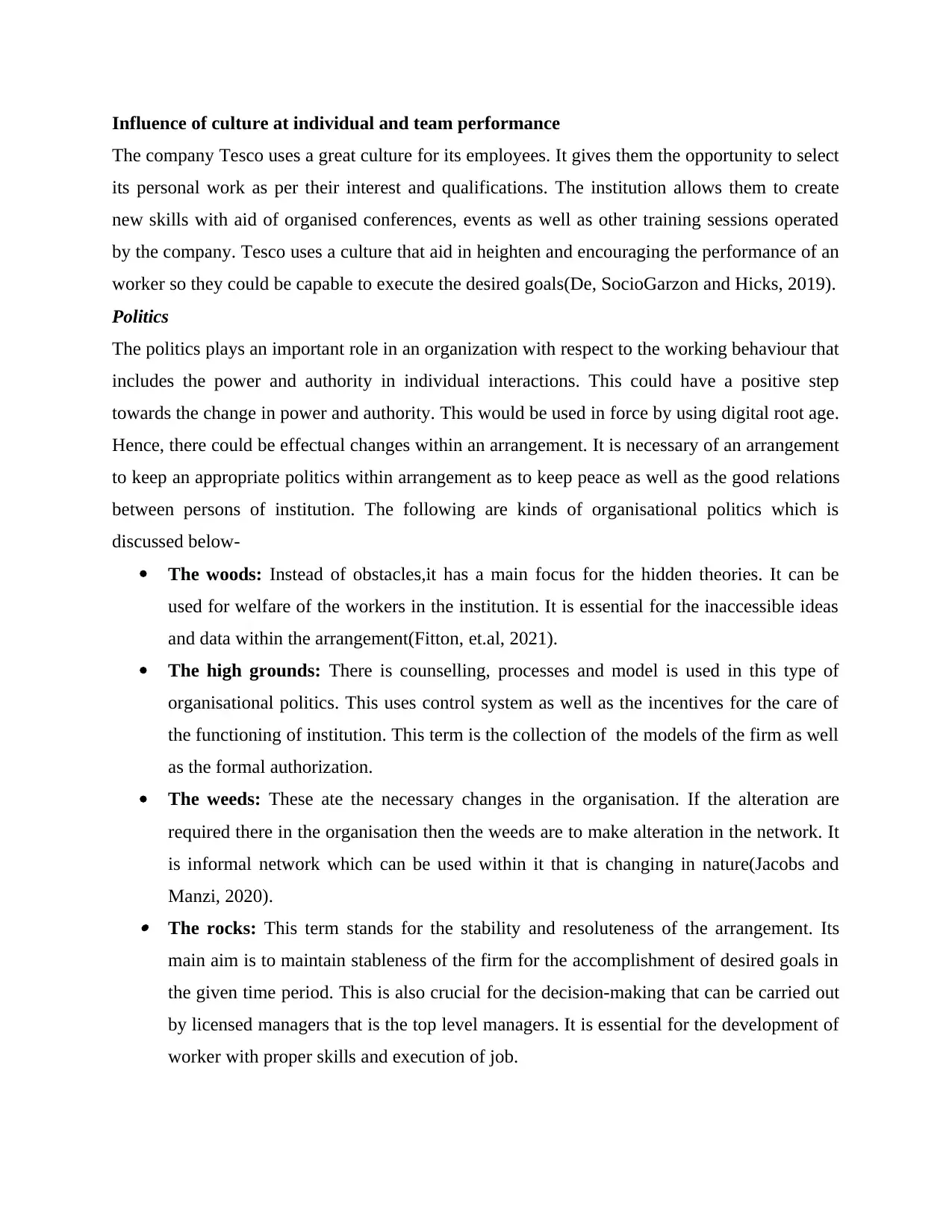
Influence of culture at individual and team performance
The company Tesco uses a great culture for its employees. It gives them the opportunity to select
its personal work as per their interest and qualifications. The institution allows them to create
new skills with aid of organised conferences, events as well as other training sessions operated
by the company. Tesco uses a culture that aid in heighten and encouraging the performance of an
worker so they could be capable to execute the desired goals(De, SocioGarzon and Hicks, 2019).
Politics
The politics plays an important role in an organization with respect to the working behaviour that
includes the power and authority in individual interactions. This could have a positive step
towards the change in power and authority. This would be used in force by using digital root age.
Hence, there could be effectual changes within an arrangement. It is necessary of an arrangement
to keep an appropriate politics within arrangement as to keep peace as well as the good relations
between persons of institution. The following are kinds of organisational politics which is
discussed below-
The woods: Instead of obstacles,it has a main focus for the hidden theories. It can be
used for welfare of the workers in the institution. It is essential for the inaccessible ideas
and data within the arrangement(Fitton, et.al, 2021).
The high grounds: There is counselling, processes and model is used in this type of
organisational politics. This uses control system as well as the incentives for the care of
the functioning of institution. This term is the collection of the models of the firm as well
as the formal authorization.
The weeds: These ate the necessary changes in the organisation. If the alteration are
required there in the organisation then the weeds are to make alteration in the network. It
is informal network which can be used within it that is changing in nature(Jacobs and
Manzi, 2020). The rocks: This term stands for the stability and resoluteness of the arrangement. Its
main aim is to maintain stableness of the firm for the accomplishment of desired goals in
the given time period. This is also crucial for the decision-making that can be carried out
by licensed managers that is the top level managers. It is essential for the development of
worker with proper skills and execution of job.
The company Tesco uses a great culture for its employees. It gives them the opportunity to select
its personal work as per their interest and qualifications. The institution allows them to create
new skills with aid of organised conferences, events as well as other training sessions operated
by the company. Tesco uses a culture that aid in heighten and encouraging the performance of an
worker so they could be capable to execute the desired goals(De, SocioGarzon and Hicks, 2019).
Politics
The politics plays an important role in an organization with respect to the working behaviour that
includes the power and authority in individual interactions. This could have a positive step
towards the change in power and authority. This would be used in force by using digital root age.
Hence, there could be effectual changes within an arrangement. It is necessary of an arrangement
to keep an appropriate politics within arrangement as to keep peace as well as the good relations
between persons of institution. The following are kinds of organisational politics which is
discussed below-
The woods: Instead of obstacles,it has a main focus for the hidden theories. It can be
used for welfare of the workers in the institution. It is essential for the inaccessible ideas
and data within the arrangement(Fitton, et.al, 2021).
The high grounds: There is counselling, processes and model is used in this type of
organisational politics. This uses control system as well as the incentives for the care of
the functioning of institution. This term is the collection of the models of the firm as well
as the formal authorization.
The weeds: These ate the necessary changes in the organisation. If the alteration are
required there in the organisation then the weeds are to make alteration in the network. It
is informal network which can be used within it that is changing in nature(Jacobs and
Manzi, 2020). The rocks: This term stands for the stability and resoluteness of the arrangement. Its
main aim is to maintain stableness of the firm for the accomplishment of desired goals in
the given time period. This is also crucial for the decision-making that can be carried out
by licensed managers that is the top level managers. It is essential for the development of
worker with proper skills and execution of job.
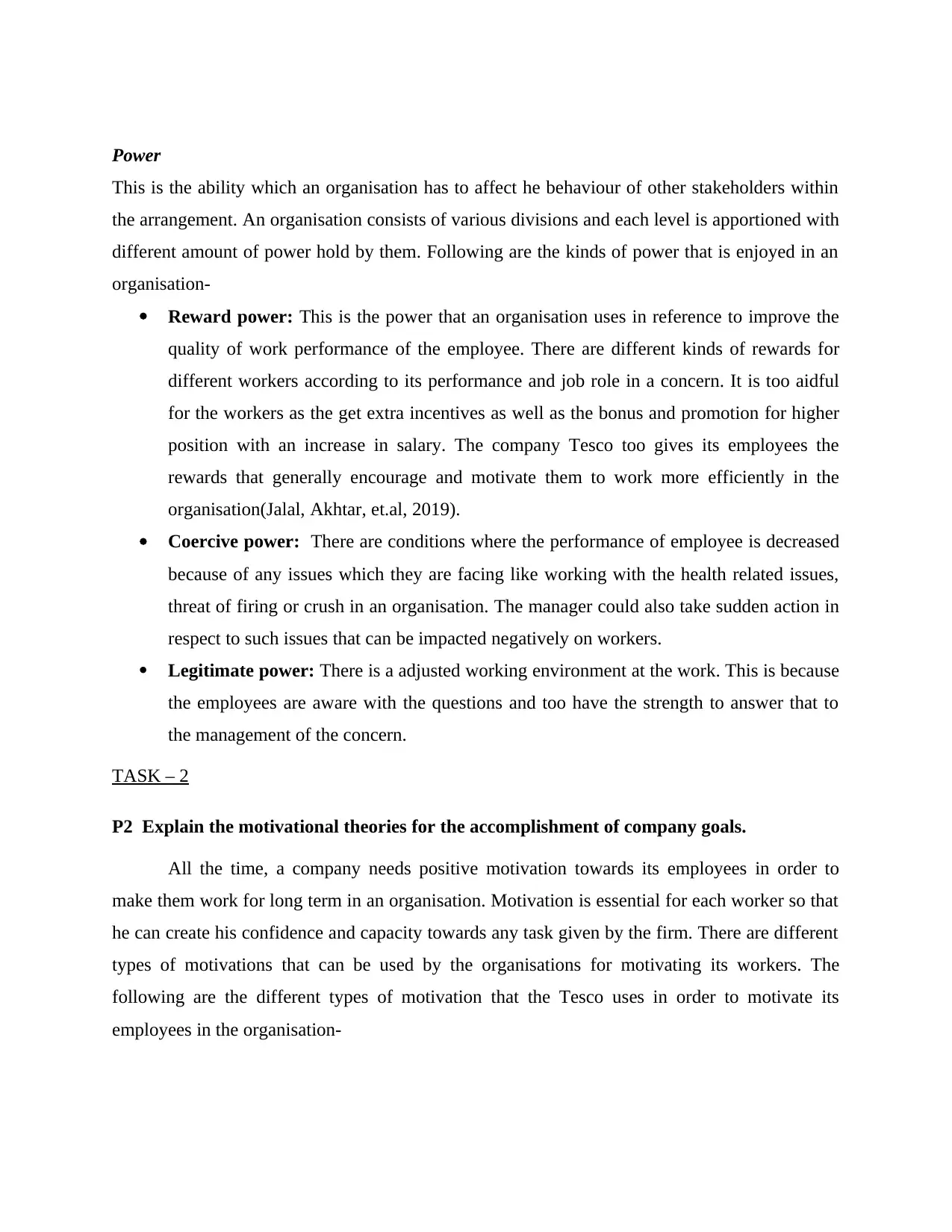
Power
This is the ability which an organisation has to affect he behaviour of other stakeholders within
the arrangement. An organisation consists of various divisions and each level is apportioned with
different amount of power hold by them. Following are the kinds of power that is enjoyed in an
organisation-
Reward power: This is the power that an organisation uses in reference to improve the
quality of work performance of the employee. There are different kinds of rewards for
different workers according to its performance and job role in a concern. It is too aidful
for the workers as the get extra incentives as well as the bonus and promotion for higher
position with an increase in salary. The company Tesco too gives its employees the
rewards that generally encourage and motivate them to work more efficiently in the
organisation(Jalal, Akhtar, et.al, 2019).
Coercive power: There are conditions where the performance of employee is decreased
because of any issues which they are facing like working with the health related issues,
threat of firing or crush in an organisation. The manager could also take sudden action in
respect to such issues that can be impacted negatively on workers.
Legitimate power: There is a adjusted working environment at the work. This is because
the employees are aware with the questions and too have the strength to answer that to
the management of the concern.
TASK – 2
P2 Explain the motivational theories for the accomplishment of company goals.
All the time, a company needs positive motivation towards its employees in order to
make them work for long term in an organisation. Motivation is essential for each worker so that
he can create his confidence and capacity towards any task given by the firm. There are different
types of motivations that can be used by the organisations for motivating its workers. The
following are the different types of motivation that the Tesco uses in order to motivate its
employees in the organisation-
This is the ability which an organisation has to affect he behaviour of other stakeholders within
the arrangement. An organisation consists of various divisions and each level is apportioned with
different amount of power hold by them. Following are the kinds of power that is enjoyed in an
organisation-
Reward power: This is the power that an organisation uses in reference to improve the
quality of work performance of the employee. There are different kinds of rewards for
different workers according to its performance and job role in a concern. It is too aidful
for the workers as the get extra incentives as well as the bonus and promotion for higher
position with an increase in salary. The company Tesco too gives its employees the
rewards that generally encourage and motivate them to work more efficiently in the
organisation(Jalal, Akhtar, et.al, 2019).
Coercive power: There are conditions where the performance of employee is decreased
because of any issues which they are facing like working with the health related issues,
threat of firing or crush in an organisation. The manager could also take sudden action in
respect to such issues that can be impacted negatively on workers.
Legitimate power: There is a adjusted working environment at the work. This is because
the employees are aware with the questions and too have the strength to answer that to
the management of the concern.
TASK – 2
P2 Explain the motivational theories for the accomplishment of company goals.
All the time, a company needs positive motivation towards its employees in order to
make them work for long term in an organisation. Motivation is essential for each worker so that
he can create his confidence and capacity towards any task given by the firm. There are different
types of motivations that can be used by the organisations for motivating its workers. The
following are the different types of motivation that the Tesco uses in order to motivate its
employees in the organisation-
⊘ This is a preview!⊘
Do you want full access?
Subscribe today to unlock all pages.

Trusted by 1+ million students worldwide
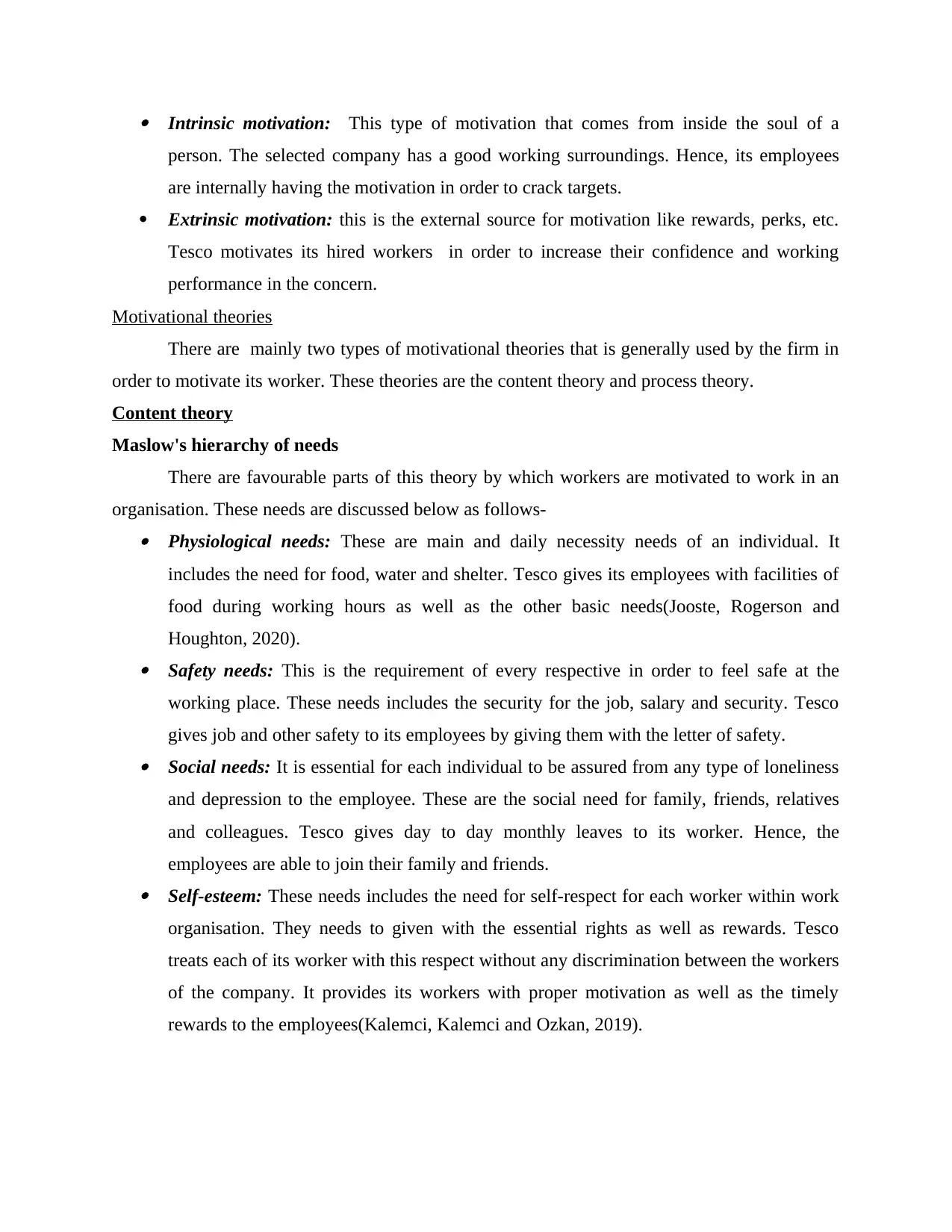
Intrinsic motivation: This type of motivation that comes from inside the soul of a
person. The selected company has a good working surroundings. Hence, its employees
are internally having the motivation in order to crack targets.
Extrinsic motivation: this is the external source for motivation like rewards, perks, etc.
Tesco motivates its hired workers in order to increase their confidence and working
performance in the concern.
Motivational theories
There are mainly two types of motivational theories that is generally used by the firm in
order to motivate its worker. These theories are the content theory and process theory.
Content theory
Maslow's hierarchy of needs
There are favourable parts of this theory by which workers are motivated to work in an
organisation. These needs are discussed below as follows- Physiological needs: These are main and daily necessity needs of an individual. It
includes the need for food, water and shelter. Tesco gives its employees with facilities of
food during working hours as well as the other basic needs(Jooste, Rogerson and
Houghton, 2020). Safety needs: This is the requirement of every respective in order to feel safe at the
working place. These needs includes the security for the job, salary and security. Tesco
gives job and other safety to its employees by giving them with the letter of safety. Social needs: It is essential for each individual to be assured from any type of loneliness
and depression to the employee. These are the social need for family, friends, relatives
and colleagues. Tesco gives day to day monthly leaves to its worker. Hence, the
employees are able to join their family and friends. Self-esteem: These needs includes the need for self-respect for each worker within work
organisation. They needs to given with the essential rights as well as rewards. Tesco
treats each of its worker with this respect without any discrimination between the workers
of the company. It provides its workers with proper motivation as well as the timely
rewards to the employees(Kalemci, Kalemci and Ozkan, 2019).
person. The selected company has a good working surroundings. Hence, its employees
are internally having the motivation in order to crack targets.
Extrinsic motivation: this is the external source for motivation like rewards, perks, etc.
Tesco motivates its hired workers in order to increase their confidence and working
performance in the concern.
Motivational theories
There are mainly two types of motivational theories that is generally used by the firm in
order to motivate its worker. These theories are the content theory and process theory.
Content theory
Maslow's hierarchy of needs
There are favourable parts of this theory by which workers are motivated to work in an
organisation. These needs are discussed below as follows- Physiological needs: These are main and daily necessity needs of an individual. It
includes the need for food, water and shelter. Tesco gives its employees with facilities of
food during working hours as well as the other basic needs(Jooste, Rogerson and
Houghton, 2020). Safety needs: This is the requirement of every respective in order to feel safe at the
working place. These needs includes the security for the job, salary and security. Tesco
gives job and other safety to its employees by giving them with the letter of safety. Social needs: It is essential for each individual to be assured from any type of loneliness
and depression to the employee. These are the social need for family, friends, relatives
and colleagues. Tesco gives day to day monthly leaves to its worker. Hence, the
employees are able to join their family and friends. Self-esteem: These needs includes the need for self-respect for each worker within work
organisation. They needs to given with the essential rights as well as rewards. Tesco
treats each of its worker with this respect without any discrimination between the workers
of the company. It provides its workers with proper motivation as well as the timely
rewards to the employees(Kalemci, Kalemci and Ozkan, 2019).
Paraphrase This Document
Need a fresh take? Get an instant paraphrase of this document with our AI Paraphraser
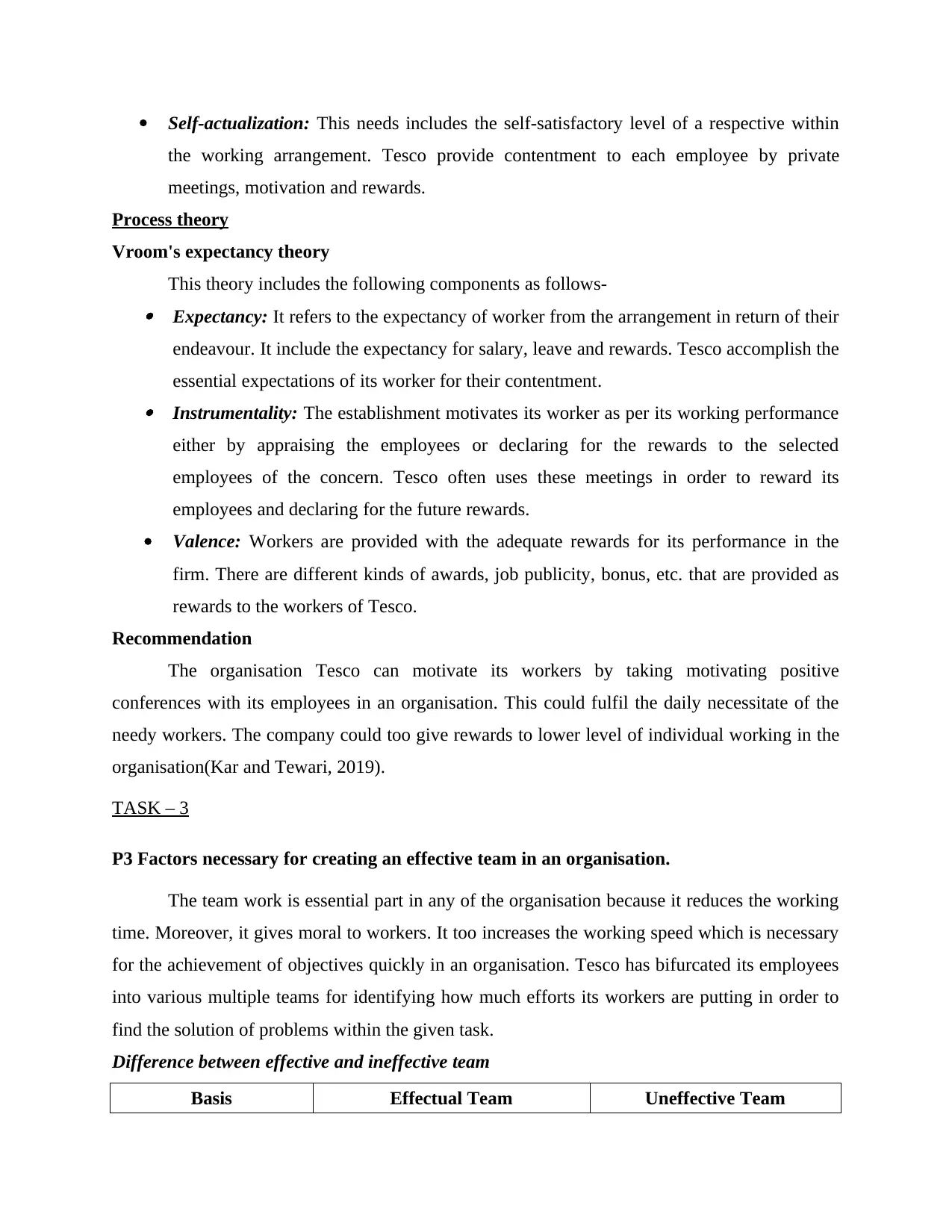
Self-actualization: This needs includes the self-satisfactory level of a respective within
the working arrangement. Tesco provide contentment to each employee by private
meetings, motivation and rewards.
Process theory
Vroom's expectancy theory
This theory includes the following components as follows- Expectancy: It refers to the expectancy of worker from the arrangement in return of their
endeavour. It include the expectancy for salary, leave and rewards. Tesco accomplish the
essential expectations of its worker for their contentment. Instrumentality: The establishment motivates its worker as per its working performance
either by appraising the employees or declaring for the rewards to the selected
employees of the concern. Tesco often uses these meetings in order to reward its
employees and declaring for the future rewards.
Valence: Workers are provided with the adequate rewards for its performance in the
firm. There are different kinds of awards, job publicity, bonus, etc. that are provided as
rewards to the workers of Tesco.
Recommendation
The organisation Tesco can motivate its workers by taking motivating positive
conferences with its employees in an organisation. This could fulfil the daily necessitate of the
needy workers. The company could too give rewards to lower level of individual working in the
organisation(Kar and Tewari, 2019).
TASK – 3
P3 Factors necessary for creating an effective team in an organisation.
The team work is essential part in any of the organisation because it reduces the working
time. Moreover, it gives moral to workers. It too increases the working speed which is necessary
for the achievement of objectives quickly in an organisation. Tesco has bifurcated its employees
into various multiple teams for identifying how much efforts its workers are putting in order to
find the solution of problems within the given task.
Difference between effective and ineffective team
Basis Effectual Team Uneffective Team
the working arrangement. Tesco provide contentment to each employee by private
meetings, motivation and rewards.
Process theory
Vroom's expectancy theory
This theory includes the following components as follows- Expectancy: It refers to the expectancy of worker from the arrangement in return of their
endeavour. It include the expectancy for salary, leave and rewards. Tesco accomplish the
essential expectations of its worker for their contentment. Instrumentality: The establishment motivates its worker as per its working performance
either by appraising the employees or declaring for the rewards to the selected
employees of the concern. Tesco often uses these meetings in order to reward its
employees and declaring for the future rewards.
Valence: Workers are provided with the adequate rewards for its performance in the
firm. There are different kinds of awards, job publicity, bonus, etc. that are provided as
rewards to the workers of Tesco.
Recommendation
The organisation Tesco can motivate its workers by taking motivating positive
conferences with its employees in an organisation. This could fulfil the daily necessitate of the
needy workers. The company could too give rewards to lower level of individual working in the
organisation(Kar and Tewari, 2019).
TASK – 3
P3 Factors necessary for creating an effective team in an organisation.
The team work is essential part in any of the organisation because it reduces the working
time. Moreover, it gives moral to workers. It too increases the working speed which is necessary
for the achievement of objectives quickly in an organisation. Tesco has bifurcated its employees
into various multiple teams for identifying how much efforts its workers are putting in order to
find the solution of problems within the given task.
Difference between effective and ineffective team
Basis Effectual Team Uneffective Team
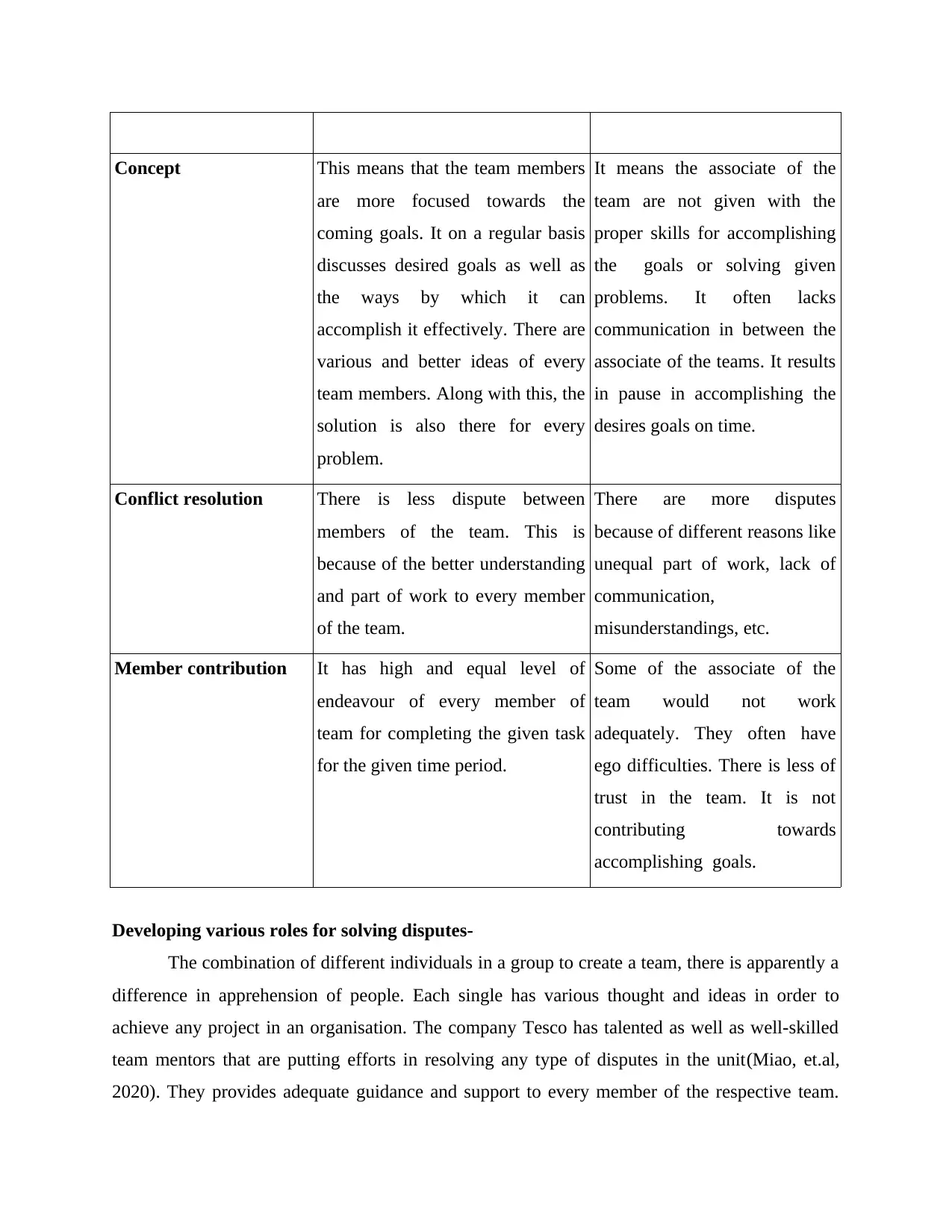
Concept This means that the team members
are more focused towards the
coming goals. It on a regular basis
discusses desired goals as well as
the ways by which it can
accomplish it effectively. There are
various and better ideas of every
team members. Along with this, the
solution is also there for every
problem.
It means the associate of the
team are not given with the
proper skills for accomplishing
the goals or solving given
problems. It often lacks
communication in between the
associate of the teams. It results
in pause in accomplishing the
desires goals on time.
Conflict resolution There is less dispute between
members of the team. This is
because of the better understanding
and part of work to every member
of the team.
There are more disputes
because of different reasons like
unequal part of work, lack of
communication,
misunderstandings, etc.
Member contribution It has high and equal level of
endeavour of every member of
team for completing the given task
for the given time period.
Some of the associate of the
team would not work
adequately. They often have
ego difficulties. There is less of
trust in the team. It is not
contributing towards
accomplishing goals.
Developing various roles for solving disputes-
The combination of different individuals in a group to create a team, there is apparently a
difference in apprehension of people. Each single has various thought and ideas in order to
achieve any project in an organisation. The company Tesco has talented as well as well-skilled
team mentors that are putting efforts in resolving any type of disputes in the unit(Miao, et.al,
2020). They provides adequate guidance and support to every member of the respective team.
are more focused towards the
coming goals. It on a regular basis
discusses desired goals as well as
the ways by which it can
accomplish it effectively. There are
various and better ideas of every
team members. Along with this, the
solution is also there for every
problem.
It means the associate of the
team are not given with the
proper skills for accomplishing
the goals or solving given
problems. It often lacks
communication in between the
associate of the teams. It results
in pause in accomplishing the
desires goals on time.
Conflict resolution There is less dispute between
members of the team. This is
because of the better understanding
and part of work to every member
of the team.
There are more disputes
because of different reasons like
unequal part of work, lack of
communication,
misunderstandings, etc.
Member contribution It has high and equal level of
endeavour of every member of
team for completing the given task
for the given time period.
Some of the associate of the
team would not work
adequately. They often have
ego difficulties. There is less of
trust in the team. It is not
contributing towards
accomplishing goals.
Developing various roles for solving disputes-
The combination of different individuals in a group to create a team, there is apparently a
difference in apprehension of people. Each single has various thought and ideas in order to
achieve any project in an organisation. The company Tesco has talented as well as well-skilled
team mentors that are putting efforts in resolving any type of disputes in the unit(Miao, et.al,
2020). They provides adequate guidance and support to every member of the respective team.
⊘ This is a preview!⊘
Do you want full access?
Subscribe today to unlock all pages.

Trusted by 1+ million students worldwide
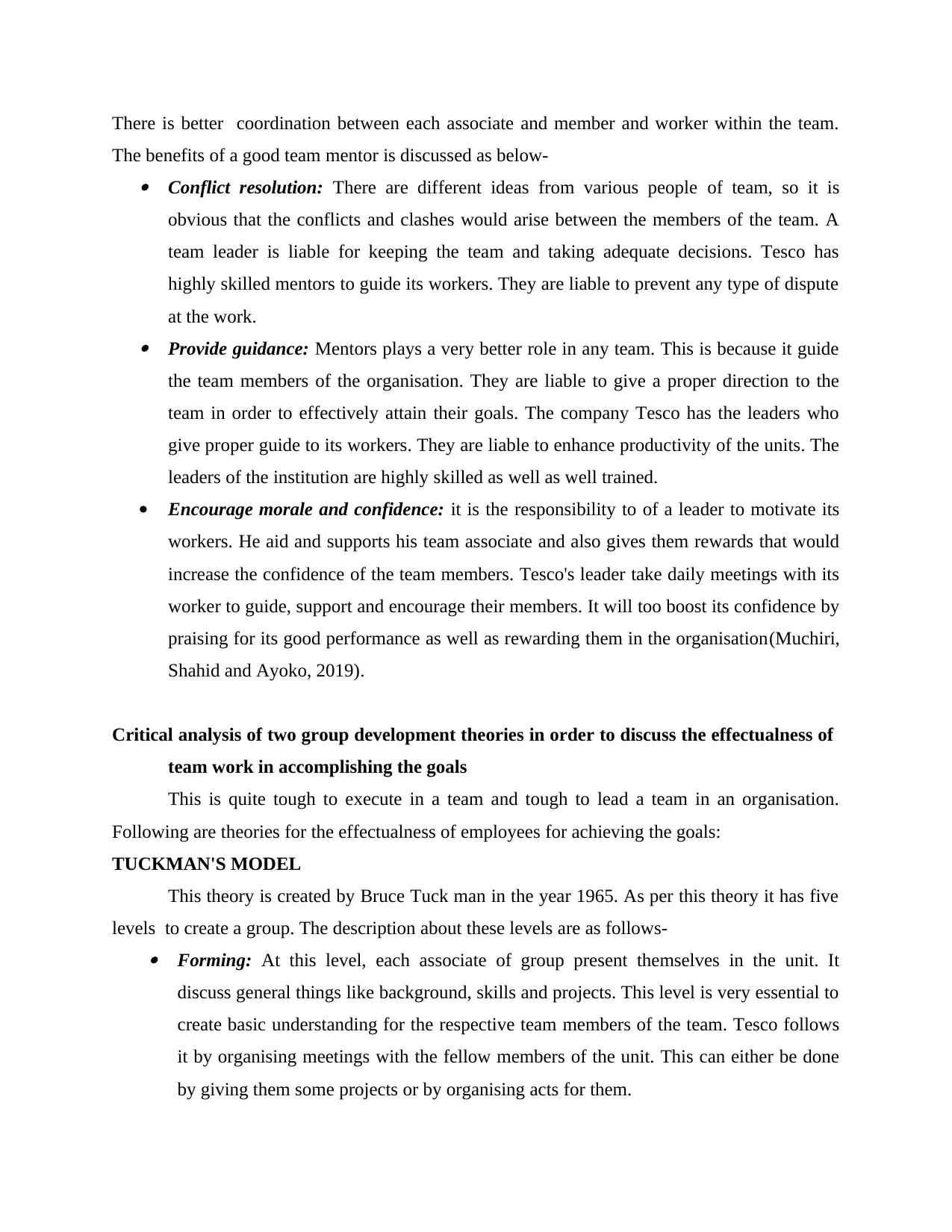
There is better coordination between each associate and member and worker within the team.
The benefits of a good team mentor is discussed as below- Conflict resolution: There are different ideas from various people of team, so it is
obvious that the conflicts and clashes would arise between the members of the team. A
team leader is liable for keeping the team and taking adequate decisions. Tesco has
highly skilled mentors to guide its workers. They are liable to prevent any type of dispute
at the work. Provide guidance: Mentors plays a very better role in any team. This is because it guide
the team members of the organisation. They are liable to give a proper direction to the
team in order to effectively attain their goals. The company Tesco has the leaders who
give proper guide to its workers. They are liable to enhance productivity of the units. The
leaders of the institution are highly skilled as well as well trained.
Encourage morale and confidence: it is the responsibility to of a leader to motivate its
workers. He aid and supports his team associate and also gives them rewards that would
increase the confidence of the team members. Tesco's leader take daily meetings with its
worker to guide, support and encourage their members. It will too boost its confidence by
praising for its good performance as well as rewarding them in the organisation(Muchiri,
Shahid and Ayoko, 2019).
Critical analysis of two group development theories in order to discuss the effectualness of
team work in accomplishing the goals
This is quite tough to execute in a team and tough to lead a team in an organisation.
Following are theories for the effectualness of employees for achieving the goals:
TUCKMAN'S MODEL
This theory is created by Bruce Tuck man in the year 1965. As per this theory it has five
levels to create a group. The description about these levels are as follows- Forming: At this level, each associate of group present themselves in the unit. It
discuss general things like background, skills and projects. This level is very essential to
create basic understanding for the respective team members of the team. Tesco follows
it by organising meetings with the fellow members of the unit. This can either be done
by giving them some projects or by organising acts for them.
The benefits of a good team mentor is discussed as below- Conflict resolution: There are different ideas from various people of team, so it is
obvious that the conflicts and clashes would arise between the members of the team. A
team leader is liable for keeping the team and taking adequate decisions. Tesco has
highly skilled mentors to guide its workers. They are liable to prevent any type of dispute
at the work. Provide guidance: Mentors plays a very better role in any team. This is because it guide
the team members of the organisation. They are liable to give a proper direction to the
team in order to effectively attain their goals. The company Tesco has the leaders who
give proper guide to its workers. They are liable to enhance productivity of the units. The
leaders of the institution are highly skilled as well as well trained.
Encourage morale and confidence: it is the responsibility to of a leader to motivate its
workers. He aid and supports his team associate and also gives them rewards that would
increase the confidence of the team members. Tesco's leader take daily meetings with its
worker to guide, support and encourage their members. It will too boost its confidence by
praising for its good performance as well as rewarding them in the organisation(Muchiri,
Shahid and Ayoko, 2019).
Critical analysis of two group development theories in order to discuss the effectualness of
team work in accomplishing the goals
This is quite tough to execute in a team and tough to lead a team in an organisation.
Following are theories for the effectualness of employees for achieving the goals:
TUCKMAN'S MODEL
This theory is created by Bruce Tuck man in the year 1965. As per this theory it has five
levels to create a group. The description about these levels are as follows- Forming: At this level, each associate of group present themselves in the unit. It
discuss general things like background, skills and projects. This level is very essential to
create basic understanding for the respective team members of the team. Tesco follows
it by organising meetings with the fellow members of the unit. This can either be done
by giving them some projects or by organising acts for them.
Paraphrase This Document
Need a fresh take? Get an instant paraphrase of this document with our AI Paraphraser
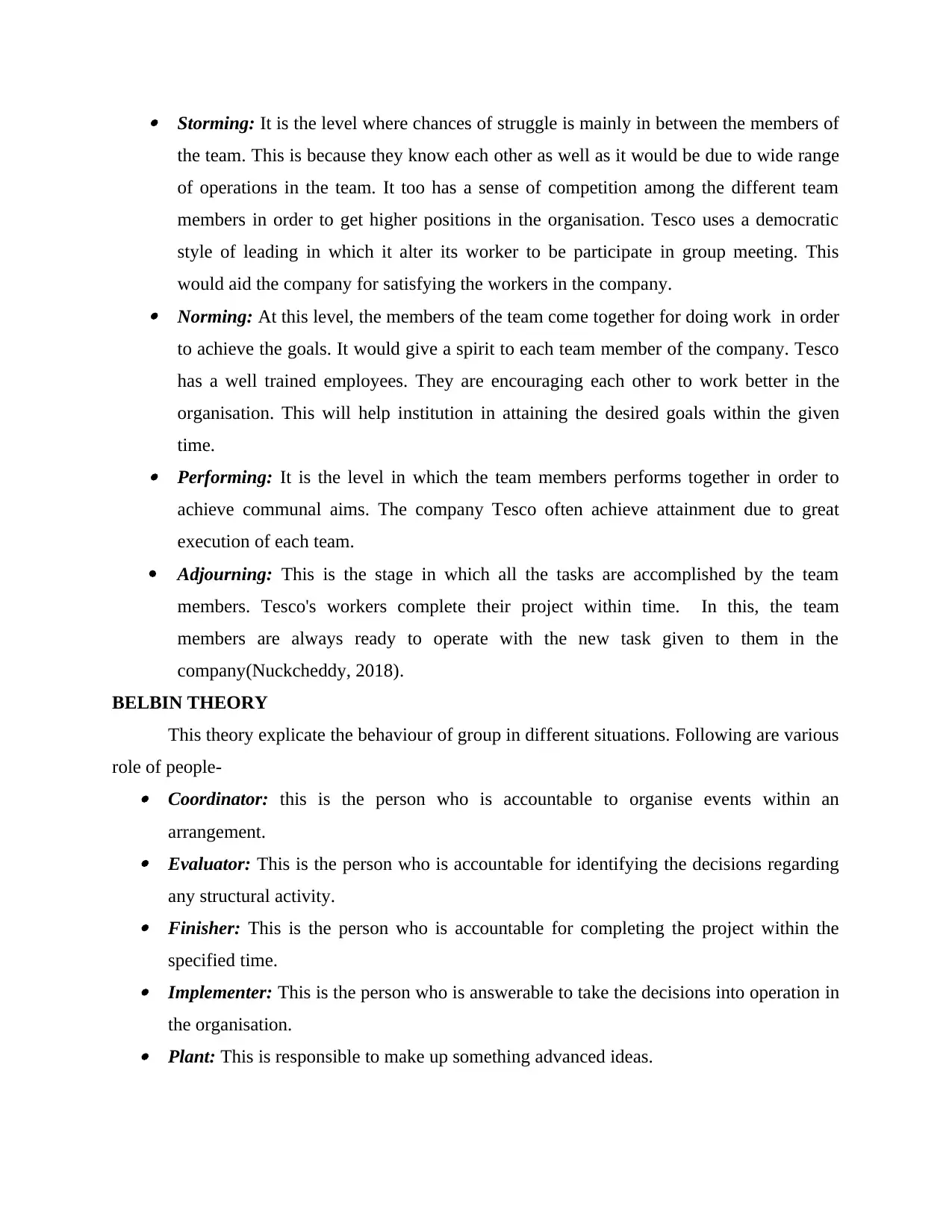
Storming: It is the level where chances of struggle is mainly in between the members of
the team. This is because they know each other as well as it would be due to wide range
of operations in the team. It too has a sense of competition among the different team
members in order to get higher positions in the organisation. Tesco uses a democratic
style of leading in which it alter its worker to be participate in group meeting. This
would aid the company for satisfying the workers in the company. Norming: At this level, the members of the team come together for doing work in order
to achieve the goals. It would give a spirit to each team member of the company. Tesco
has a well trained employees. They are encouraging each other to work better in the
organisation. This will help institution in attaining the desired goals within the given
time. Performing: It is the level in which the team members performs together in order to
achieve communal aims. The company Tesco often achieve attainment due to great
execution of each team.
Adjourning: This is the stage in which all the tasks are accomplished by the team
members. Tesco's workers complete their project within time. In this, the team
members are always ready to operate with the new task given to them in the
company(Nuckcheddy, 2018).
BELBIN THEORY
This theory explicate the behaviour of group in different situations. Following are various
role of people- Coordinator: this is the person who is accountable to organise events within an
arrangement. Evaluator: This is the person who is accountable for identifying the decisions regarding
any structural activity. Finisher: This is the person who is accountable for completing the project within the
specified time. Implementer: This is the person who is answerable to take the decisions into operation in
the organisation. Plant: This is responsible to make up something advanced ideas.
the team. This is because they know each other as well as it would be due to wide range
of operations in the team. It too has a sense of competition among the different team
members in order to get higher positions in the organisation. Tesco uses a democratic
style of leading in which it alter its worker to be participate in group meeting. This
would aid the company for satisfying the workers in the company. Norming: At this level, the members of the team come together for doing work in order
to achieve the goals. It would give a spirit to each team member of the company. Tesco
has a well trained employees. They are encouraging each other to work better in the
organisation. This will help institution in attaining the desired goals within the given
time. Performing: It is the level in which the team members performs together in order to
achieve communal aims. The company Tesco often achieve attainment due to great
execution of each team.
Adjourning: This is the stage in which all the tasks are accomplished by the team
members. Tesco's workers complete their project within time. In this, the team
members are always ready to operate with the new task given to them in the
company(Nuckcheddy, 2018).
BELBIN THEORY
This theory explicate the behaviour of group in different situations. Following are various
role of people- Coordinator: this is the person who is accountable to organise events within an
arrangement. Evaluator: This is the person who is accountable for identifying the decisions regarding
any structural activity. Finisher: This is the person who is accountable for completing the project within the
specified time. Implementer: This is the person who is answerable to take the decisions into operation in
the organisation. Plant: This is responsible to make up something advanced ideas.
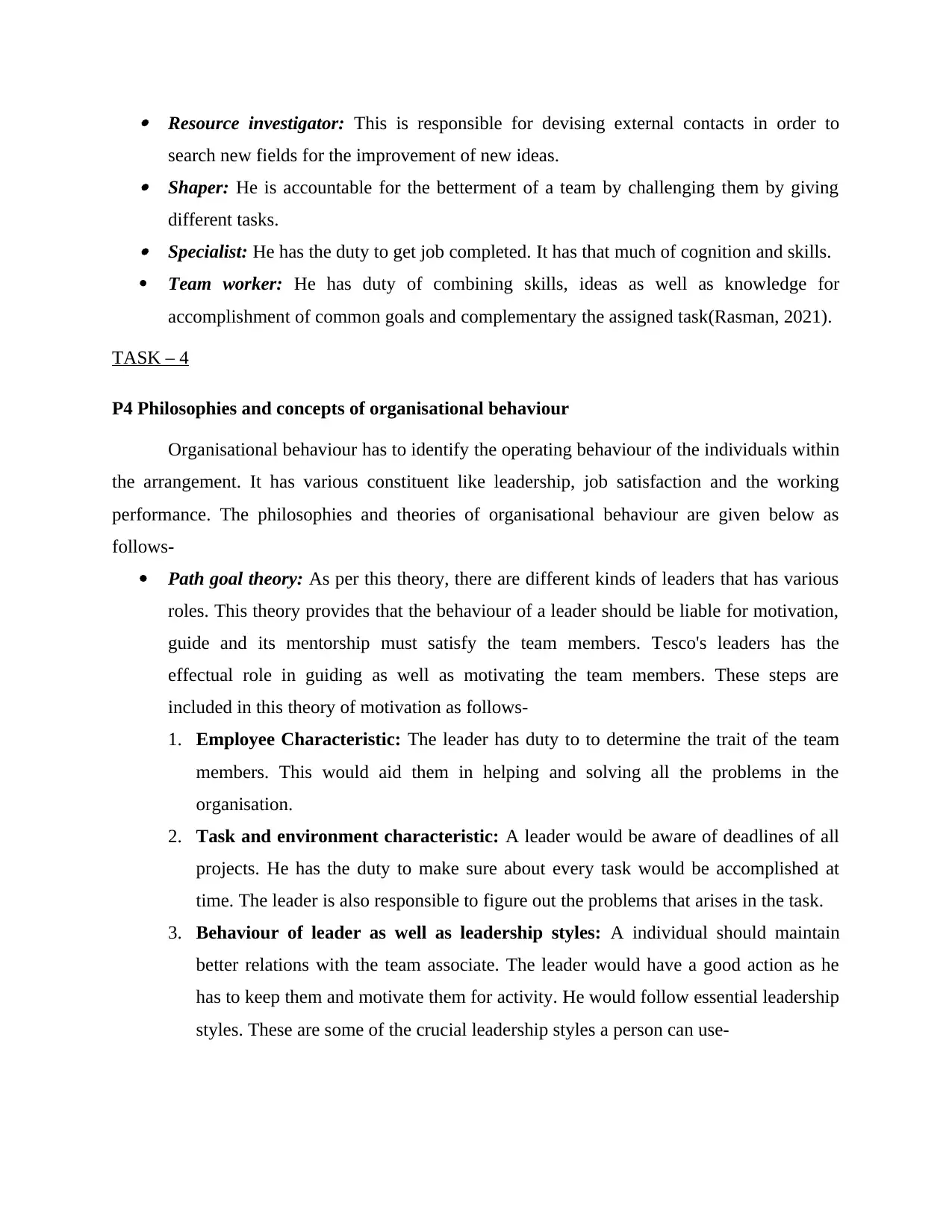
Resource investigator: This is responsible for devising external contacts in order to
search new fields for the improvement of new ideas. Shaper: He is accountable for the betterment of a team by challenging them by giving
different tasks. Specialist: He has the duty to get job completed. It has that much of cognition and skills.
Team worker: He has duty of combining skills, ideas as well as knowledge for
accomplishment of common goals and complementary the assigned task(Rasman, 2021).
TASK – 4
P4 Philosophies and concepts of organisational behaviour
Organisational behaviour has to identify the operating behaviour of the individuals within
the arrangement. It has various constituent like leadership, job satisfaction and the working
performance. The philosophies and theories of organisational behaviour are given below as
follows-
Path goal theory: As per this theory, there are different kinds of leaders that has various
roles. This theory provides that the behaviour of a leader should be liable for motivation,
guide and its mentorship must satisfy the team members. Tesco's leaders has the
effectual role in guiding as well as motivating the team members. These steps are
included in this theory of motivation as follows-
1. Employee Characteristic: The leader has duty to to determine the trait of the team
members. This would aid them in helping and solving all the problems in the
organisation.
2. Task and environment characteristic: A leader would be aware of deadlines of all
projects. He has the duty to make sure about every task would be accomplished at
time. The leader is also responsible to figure out the problems that arises in the task.
3. Behaviour of leader as well as leadership styles: A individual should maintain
better relations with the team associate. The leader would have a good action as he
has to keep them and motivate them for activity. He would follow essential leadership
styles. These are some of the crucial leadership styles a person can use-
search new fields for the improvement of new ideas. Shaper: He is accountable for the betterment of a team by challenging them by giving
different tasks. Specialist: He has the duty to get job completed. It has that much of cognition and skills.
Team worker: He has duty of combining skills, ideas as well as knowledge for
accomplishment of common goals and complementary the assigned task(Rasman, 2021).
TASK – 4
P4 Philosophies and concepts of organisational behaviour
Organisational behaviour has to identify the operating behaviour of the individuals within
the arrangement. It has various constituent like leadership, job satisfaction and the working
performance. The philosophies and theories of organisational behaviour are given below as
follows-
Path goal theory: As per this theory, there are different kinds of leaders that has various
roles. This theory provides that the behaviour of a leader should be liable for motivation,
guide and its mentorship must satisfy the team members. Tesco's leaders has the
effectual role in guiding as well as motivating the team members. These steps are
included in this theory of motivation as follows-
1. Employee Characteristic: The leader has duty to to determine the trait of the team
members. This would aid them in helping and solving all the problems in the
organisation.
2. Task and environment characteristic: A leader would be aware of deadlines of all
projects. He has the duty to make sure about every task would be accomplished at
time. The leader is also responsible to figure out the problems that arises in the task.
3. Behaviour of leader as well as leadership styles: A individual should maintain
better relations with the team associate. The leader would have a good action as he
has to keep them and motivate them for activity. He would follow essential leadership
styles. These are some of the crucial leadership styles a person can use-
⊘ This is a preview!⊘
Do you want full access?
Subscribe today to unlock all pages.

Trusted by 1+ million students worldwide
1 out of 15
Related Documents
Your All-in-One AI-Powered Toolkit for Academic Success.
+13062052269
info@desklib.com
Available 24*7 on WhatsApp / Email
![[object Object]](/_next/static/media/star-bottom.7253800d.svg)
Unlock your academic potential
Copyright © 2020–2025 A2Z Services. All Rights Reserved. Developed and managed by ZUCOL.




